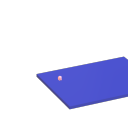Stop Stream of Bangs after threshold
@dkeller Even working with some of the Jazz "greats".... or should that be "grates"?..... I have met almost none that can truly improvise. A huge learned repertoire of perfect riffs seems to inhibit their ability to really innovate.
This could perhaps be a great learning tool.
Pd looks in its standard directory (Pd/bin) and the externals folder (Pd/extra) and the patch folder as it opens a patch. You can add other paths to search in Pd preferences.
If you put an external or an abstraction (like [once]... abstraction because just a patch... not compiled) in the same folder as the patch it will work just with that patch.
If you put it in a sub-folder then in the patch you will have to tell Pd where to look..... so [subfolder/once] in your patch instead of [once]....... or declare the path in the patch by placing an object [declare -path subfolder] in the patch.
If you want to use it everywhere then dump it in the extra folder...... which means you can put it in every patch..... BUT..... when you share the patch you will need to remember to bundle it or the recipient will not be able to create the object.
David.
phase index of an oscillator and 1 sample delay in pd?
@KMETE
the Max patch looks like feedback-FM to me. For PM the + would be placed between phasor and circle, if I'm not mistaken.
And with 1000 ms delay, as I read the Max patch? there would be no need for 1 sample-blocks.
A thread on this topic:
https://forum.pdpatchrepo.info/topic/6185/feedback-fm-algorithm
DC-blocking you can do with [hip~ 20] for example (I'd put it in the feedback-loop).
cycle object
[cos~] ? Is a cosine-tabel, to get a sine you can drive it like this:
[phasor~]
|
[-~ 0.25]
|
[cos~]
Offtopic: Pd's cosine has a slight DC-offset.
https://forum.pdpatchrepo.info/topic/13709/bug-osc-cos-circle-asymmetry-drifting-out-of-phase
@alexandros said:
Creating a one-sample delay is achieved by placing your objects in a subpatch and putting a
[block~ 1]object in there. Then you have to use[tabsend~]and[tabreceive~]instead of[delwrite~]and[delread~]to achieve the one-sample delay.
Yes. And be aware of the importance of creating [tabsend~] beforehand of [tabreceive~] . You can read about in the Pd documentation 3.audio.example > G05.execution.order.pd
For feedback, I usually build subpatches with such a dummy-connection, save the patch, and delete the dummy cable lastly and save again, for perceving the execution order and avoiding a dsp-loop.
[delwrite~] and [delread~] can become as short as 1 sample, too.
In both [osc~] and [phasor~], the phase is set by control messages, but since you'll have a one-sample block size, that shouldn't be a problem, you can just set the phase to what ever you like and it will be reset at the next sample block (one sample later).
This is one of the biggest myths in Pd (at least for me), but unfortunately not true. (Vanilla 52.2)
See vphasor~-help : https://github.com/dotmmb/mmb
Still the same, if you put it in a subpatch with [block~ 1].
Documentation is lacking here. There are very few timing- sample- or phase-critical control-objects that are able to update (sub-)sample-accurately in-between block-boundaries of 64 samples minimum:
I only know of [bang~], [metro], [delay], [pipe], [vline~]
Controlling Pd from another programme
@Worik Not sure what you are looking for.....
If you want to open a patch from the command line you can open Pd and a patch with a batch file...... in windows it would look something like this....
"C:\Program Files (x86)\pd\bin\pd.com" -path C:\Users\David\Desktop\PDMusic\Minx -path C:\Program_Files_(x86)\pd\extra\readanysf~\ -r 44100 -asio -nomidi -audioindev 20 -audiooutdev 15 -inchannels 32 -outchannels 22 -audiobuf 2 -blocksize 64 -callback -nosleep -open Minx_Run.pd
exit`
which on my system opens Minx_run.Pd and tells Pd where to find it........ \PdMusic\Minx
It also sets a load of command line switches...... to set up audio for this very specific instance (useful!).
There will be similar methods in other os's.
When you want to close the patch (and Pd) you kill the Dos window that the batch file created.
Messages can be sent to Pd to close a specific patch..... but another patch will have to be open (probably the one receiving the message) or Pd will terminate.
It can be done from within the patch but its complicated........ https://forum.pdpatchrepo.info/topic/11710/closing-patches-without-pd-crashing-hopefully-in-an-elegant-way ...... and not easy.
If you want to keep Pd open and control from another program........ then as @seb-harmonik.ar describes........ but the menuclose message might crash Pd if another patch (any patch) is not open........ https://forum.pdpatchrepo.info/topic/4063/close-patch-window-command-object
Anyway, it is cleaner to use a second patch to receive your messages and close the desired patch.
David.
Can't install purr-data on Manjaro
Hey, I'm trying to get purr-data to work on my fresh Manjaro XFCE install, but it does not work. Any help is greatly appreciated!
$ yay purr-data
7 aur/purrdata-faust 0.18-1 (+0 0.00)
Run Faust signal processors in Pd, Purr-Data version
6 aur/purrdata-pure 0.26-1 (+0 0.00)
Loader plugin for the Pure programming language, Purr-Data version
5 aur/purrdata-lv2plugin-git 25.e00f302-1 (+0 0.00)
LV2 plugin host for Pd, Purr-Data version
4 aur/purrdata-mdnsbrowser-git 8.88d2b0c-1 (+0 0.00)
Zeroconf service advertising and discovery for Pd, Purr-Data version
3 aur/purrdata-touchosc-git 44.443c793-1 (+0 0.00)
A TouchOSC MIDI bridge for Pd, Purr-Data version
2 aur/purr-data-git 2.12.0.r4366.6d94e10b-1 (+2 0.00)
Jonathan Wilkes' nw.js variant of Pd-L2Ork (git version)
1 aur/purr-data 2.12.0.r4346.aeb24d89-1 (+6 0.03) (Out-of-date: 2021-06-17)
Jonathan Wilkes' nw.js variant of Pd-L2Ork (git version)
==> Packages to install (eg: 1 2 3, 1-3 or ^4)
==> 2
:: There are 2 providers available for gconf:
:: Repository AUR
1) gconf 2) gconf-gtk2
Enter a number (default=1): ==>
:: Checking for conflicts...
:: Checking for inner conflicts...
[Aur:2] gconf-3.2.6+11+g07808097-10 purr-data-git-2.12.0.r4366.6d94e10b-1
2 gconf (Build Files Exist)
1 purr-data-git
==> Packages to cleanBuild?
==> [N]one [A]ll [Ab]ort [I]nstalled [No]tInstalled or (1 2 3, 1-3, ^4)
==> a
:: Deleting (1/1): /home/olav/.cache/yay/gconf
:: (1/2) Downloaded PKGBUILD: gconf
:: (2/2) Downloaded PKGBUILD: purr-data-git
2 gconf (Build Files Exist)
1 purr-data-git (Build Files Exist)
==> Diffs to show?
==> [N]one [A]ll [Ab]ort [I]nstalled [No]tInstalled or (1 2 3, 1-3, ^4)
==>
:: (1/2) Parsing SRCINFO: gconf
:: (2/2) Parsing SRCINFO: purr-data-git
==> Making package: gconf 3.2.6+11+g07808097-10 (Wed 09 Feb 2022 10:23:23 PM CET)
==> Retrieving sources...
-> Cloning gconf git repo...
Cloning into bare repository '/home/olav/.cache/yay/gconf/gconf'...
==> Making package: purr-data-git 2.12.0.r4366.6d94e10b-1 (Wed 09 Feb 2022 10:23:23 PM CET)
==> Retrieving sources...
-> Cloning purr-data-git git repo...
Cloning into bare repository '/home/olav/.cache/yay/purr-data-git/purr-data-git'...
remote: Enumerating objects: 21531, done.
remote: Enumerating objects: 63399, done.
remote: Counting objects: 100% (1852/1852), done.
remote: Compressing objects: 100% (641/641), done.
remote: Total 21531 (delta 0), reused 0 (delta 0), pack-reused 21531
Receiving objects: 100% (21531/21531), 10.88 MiB | 9.46 MiB/s, done.
Resolving deltas: 100% (17681/17681), done.1 KiB | 704.00 KiB/s
-> Found 01_xml-gettext-domain.patch388.01 KiB | 704.00 KiB/s
-> Found gconf-reload.patch
-> Found gconf-merge-schema
-> Found gconfpkg
-> Found gconf-install.hook
-> Found gconf-remove.hook
==> Validating source files with sha256sums...
gconf ... Skipped
01_xml-gettext-domain.patch ... Passed
gconf-reload.patch ... Passed
gconf-merge-schema ... Passed
gconfpkg ... Passed
gconf-install.hook ... Passed
gconf-remove.hook ... Passed
remote: Total 63399 (delta 1106), reused 1786 (delta 1052), pack-reused 61547
Receiving objects: 100% (63399/63399), 177.19 MiB | 5.71 MiB/s, done.
Resolving deltas: 100% (33721/33721), done.
-> Downloading nwjs-sdk-v0.24.4-linux-x64.tar.gz...
% Total % Received % Xferd Average Speed Time Time Time Current
Dload Upload Total Spent Left Speed
100 86.7M 100 86.7M 0 0 3966k 0 0:00:22 0:00:22 --:--:-- 8404k
==> Validating source files with md5sums...
purr-data-git ... Skipped
==> Validating source_x86_64 files with md5sums...
nwjs-sdk-v0.24.4-linux-x64.tar.gz ... Passed
==> Making package: gconf 3.2.6+11+g07808097-10 (Wed 09 Feb 2022 10:24:19 PM CET)
==> Checking runtime dependencies...
==> Checking buildtime dependencies...
==> Retrieving sources...
-> Updating gconf git repo...
Fetching origin
-> Found 01_xml-gettext-domain.patch
-> Found gconf-reload.patch
-> Found gconf-merge-schema
-> Found gconfpkg
-> Found gconf-install.hook
-> Found gconf-remove.hook
==> Validating source files with sha256sums...
gconf ... Skipped
01_xml-gettext-domain.patch ... Passed
gconf-reload.patch ... Passed
gconf-merge-schema ... Passed
gconfpkg ... Passed
gconf-install.hook ... Passed
gconf-remove.hook ... Passed
==> Removing existing $srcdir/ directory...
==> Extracting sources...
-> Creating working copy of gconf git repo...
Cloning into 'gconf'...
done.
Switched to a new branch 'makepkg'
==> Starting prepare()...
/home/olav/.cache/yay/gconf/PKGBUILD: line 30: patch: command not found
==> ERROR: A failure occurred in prepare().
Aborting...
-> error making: gconf
And
yay purr-data
7 aur/purrdata-faust 0.18-1 (+0 0.00)
Run Faust signal processors in Pd, Purr-Data version
6 aur/purrdata-pure 0.26-1 (+0 0.00)
Loader plugin for the Pure programming language, Purr-Data version
5 aur/purrdata-lv2plugin-git 25.e00f302-1 (+0 0.00)
LV2 plugin host for Pd, Purr-Data version
4 aur/purrdata-mdnsbrowser-git 8.88d2b0c-1 (+0 0.00)
Zeroconf service advertising and discovery for Pd, Purr-Data version
3 aur/purrdata-touchosc-git 44.443c793-1 (+0 0.00)
A TouchOSC MIDI bridge for Pd, Purr-Data version
2 aur/purr-data-git 2.12.0.r4366.6d94e10b-1 (+2 0.00)
Jonathan Wilkes' nw.js variant of Pd-L2Ork (git version)
1 aur/purr-data 2.12.0.r4346.aeb24d89-1 (+6 0.03) (Out-of-date: 2021-06-17)
Jonathan Wilkes' nw.js variant of Pd-L2Ork (git version)
==> Packages to install (eg: 1 2 3, 1-3 or ^4)
==> 2
:: There are 2 providers available for gconf:
:: Repository AUR
1) gconf 2) gconf-gtk2
Enter a number (default=1): ==>
:: Checking for conflicts...
:: Checking for inner conflicts...
[Aur:2] gconf-3.2.6+11+g07808097-10 purr-data-git-2.12.0.r4366.6d94e10b-1
2 gconf (Build Files Exist)
1 purr-data-git
==> Packages to cleanBuild?
==> [N]one [A]ll [Ab]ort [I]nstalled [No]tInstalled or (1 2 3, 1-3, ^4)
==> a
:: Deleting (1/1): /home/olav/.cache/yay/gconf
:: (1/2) Downloaded PKGBUILD: gconf
:: (2/2) Downloaded PKGBUILD: purr-data-git
2 gconf (Build Files Exist)
1 purr-data-git (Build Files Exist)
==> Diffs to show?
==> [N]one [A]ll [Ab]ort [I]nstalled [No]tInstalled or (1 2 3, 1-3, ^4)
==>
:: (1/2) Parsing SRCINFO: gconf
:: (2/2) Parsing SRCINFO: purr-data-git
==> Making package: gconf 3.2.6+11+g07808097-10 (Wed 09 Feb 2022 10:23:23 PM CET)
==> Retrieving sources...
-> Cloning gconf git repo...
Cloning into bare repository '/home/olav/.cache/yay/gconf/gconf'...
==> Making package: purr-data-git 2.12.0.r4366.6d94e10b-1 (Wed 09 Feb 2022 10:23:23 PM CET)
==> Retrieving sources...
-> Cloning purr-data-git git repo...
Cloning into bare repository '/home/olav/.cache/yay/purr-data-git/purr-data-git'...
remote: Enumerating objects: 21531, done.
remote: Enumerating objects: 63399, done.
remote: Counting objects: 100% (1852/1852), done.
remote: Compressing objects: 100% (641/641), done.
remote: Total 21531 (delta 0), reused 0 (delta 0), pack-reused 21531
Receiving objects: 100% (21531/21531), 10.88 MiB | 9.46 MiB/s, done.
Resolving deltas: 100% (17681/17681), done.1 KiB | 704.00 KiB/s
-> Found 01_xml-gettext-domain.patch388.01 KiB | 704.00 KiB/s
-> Found gconf-reload.patch
-> Found gconf-merge-schema
-> Found gconfpkg
-> Found gconf-install.hook
-> Found gconf-remove.hook
==> Validating source files with sha256sums...
gconf ... Skipped
01_xml-gettext-domain.patch ... Passed
gconf-reload.patch ... Passed
gconf-merge-schema ... Passed
gconfpkg ... Passed
gconf-install.hook ... Passed
gconf-remove.hook ... Passed
remote: Total 63399 (delta 1106), reused 1786 (delta 1052), pack-reused 61547
Receiving objects: 100% (63399/63399), 177.19 MiB | 5.71 MiB/s, done.
Resolving deltas: 100% (33721/33721), done.
-> Downloading nwjs-sdk-v0.24.4-linux-x64.tar.gz...
% Total % Received % Xferd Average Speed Time Time Time Current
Dload Upload Total Spent Left Speed
100 86.7M 100 86.7M 0 0 3966k 0 0:00:22 0:00:22 --:--:-- 8404k
==> Validating source files with md5sums...
purr-data-git ... Skipped
==> Validating source_x86_64 files with md5sums...
nwjs-sdk-v0.24.4-linux-x64.tar.gz ... Passed
==> Making package: gconf 3.2.6+11+g07808097-10 (Wed 09 Feb 2022 10:24:19 PM CET)
==> Checking runtime dependencies...
==> Checking buildtime dependencies...
==> Retrieving sources...
-> Updating gconf git repo...
Fetching origin
-> Found 01_xml-gettext-domain.patch
-> Found gconf-reload.patch
-> Found gconf-merge-schema
-> Found gconfpkg
-> Found gconf-install.hook
-> Found gconf-remove.hook
==> Validating source files with sha256sums...
gconf ... Skipped
01_xml-gettext-domain.patch ... Passed
gconf-reload.patch ... Passed
gconf-merge-schema ... Passed
gconfpkg ... Passed
gconf-install.hook ... Passed
gconf-remove.hook ... Passed
==> Removing existing $srcdir/ directory...
==> Extracting sources...
-> Creating working copy of gconf git repo...
Cloning into 'gconf'...
done.
Switched to a new branch 'makepkg'
==> Starting prepare()...
/home/olav/.cache/yay/gconf/PKGBUILD: line 30: patch: command not found
==> ERROR: A failure occurred in prepare().
Aborting...
-> error making: gconf
[olav@AMD-Computer ~]$ yay purr-data
7 aur/purrdata-faust 0.18-1 (+0 0.00)
Run Faust signal processors in Pd, Purr-Data version
6 aur/purrdata-pure 0.26-1 (+0 0.00)
Loader plugin for the Pure programming language, Purr-Data version
5 aur/purrdata-lv2plugin-git 25.e00f302-1 (+0 0.00)
LV2 plugin host for Pd, Purr-Data version
4 aur/purrdata-mdnsbrowser-git 8.88d2b0c-1 (+0 0.00)
Zeroconf service advertising and discovery for Pd, Purr-Data version
3 aur/purrdata-touchosc-git 44.443c793-1 (+0 0.00)
A TouchOSC MIDI bridge for Pd, Purr-Data version
2 aur/purr-data-git 2.12.0.r4366.6d94e10b-1 (+2 0.00)
Jonathan Wilkes' nw.js variant of Pd-L2Ork (git version)
1 aur/purr-data 2.12.0.r4346.aeb24d89-1 (+6 0.03) (Out-of-date: 2021-06-17)
Jonathan Wilkes' nw.js variant of Pd-L2Ork (git version)
==> Packages to install (eg: 1 2 3, 1-3 or ^4)
==> 2
:: There are 2 providers available for gconf:
:: Repository AUR
1) gconf 2) gconf-gtk2
Enter a number (default=1): ==> 2
:: Checking for conflicts...
:: Checking for inner conflicts...
[Aur:2] gconf-gtk2-3.2.6-5 purr-data-git-2.12.0.r4366.6d94e10b-1
2 gconf-gtk2 (Build Files Exist)
1 purr-data-git (Build Files Exist)
==> Packages to cleanBuild?
==> [N]one [A]ll [Ab]ort [I]nstalled [No]tInstalled or (1 2 3, 1-3, ^4)
==> a
:: Deleting (1/2): /home/olav/.cache/yay/gconf-gtk2
:: Deleting (2/2): /home/olav/.cache/yay/purr-data-git
:: (1/2) Downloaded PKGBUILD: purr-data-git
:: (2/2) Downloaded PKGBUILD: gconf-gtk2
2 gconf-gtk2 (Build Files Exist)
1 purr-data-git (Build Files Exist)
==> Diffs to show?
==> [N]one [A]ll [Ab]ort [I]nstalled [No]tInstalled or (1 2 3, 1-3, ^4)
==>
:: (1/2) Parsing SRCINFO: gconf-gtk2
:: (2/2) Parsing SRCINFO: purr-data-git
==> Making package: purr-data-git 2.12.0.r4366.6d94e10b-1 (Wed 09 Feb 2022 10:40:58 PM CET)
==> Retrieving sources...
==> Making package: gconf-gtk2 3.2.6-5 (Wed 09 Feb 2022 10:40:58 PM CET)
==> Retrieving sources...
-> Cloning purr-data-git git repo...
Cloning into bare repository '/home/olav/.cache/yay/purr-data-git/purr-data-git'...
-> Downloading GConf-3.2.6.tar.xz...
% Total % Received % Xferd Average Speed Time Time Time Current
Dload Upload Total Spent Left Speed
0 0 0 0 0 0 0 0 --:--:-- --:--:-- --:--:-- 0
100 1523k 100 1523k 0 0 1610k 0 --:--:-- --:--:-- --:--:-- 1610k
-> Found gconf-merge-schema
-> Found gconfpkg
-> Found gconf-reload.patch
-> Found gconf-install.hook
-> Found gconf-remove.hook
-> Found 01_xml-gettext-domain.patch
-> Found dbus-dontspew.patch
-> Found gsettings-data-convert-fix-invalid-schema-path.patch
==> Validating source files with sha256sums...
GConf-3.2.6.tar.xz ... Passed
gconf-merge-schema ... Passed
gconfpkg ... Passed
gconf-reload.patch ... Passed
gconf-install.hook ... Passed
gconf-remove.hook ... Passed
01_xml-gettext-domain.patch ... Passed
dbus-dontspew.patch ... Passed
gsettings-data-convert-fix-invalid-schema-path.patch ... Passed
remote: Enumerating objects: 63399, done.
remote: Counting objects: 100% (1852/1852), done.
remote: Compressing objects: 100% (641/641), done.
remote: Total 63399 (delta 1106), reused 1786 (delta 1052), pack-reused 61547
Receiving objects: 100% (63399/63399), 177.19 MiB | 9.76 MiB/s, done.
Resolving deltas: 100% (33721/33721), done.
-> Downloading nwjs-sdk-v0.24.4-linux-x64.tar.gz...
% Total % Received % Xferd Average Speed Time Time Time Current
Dload Upload Total Spent Left Speed
100 86.7M 100 86.7M 0 0 11.7M 0 0:00:07 0:00:07 --:--:-- 14.4M
==> Validating source files with md5sums...
purr-data-git ... Skipped
==> Validating source_x86_64 files with md5sums...
nwjs-sdk-v0.24.4-linux-x64.tar.gz ... Passed
==> Making package: gconf-gtk2 3.2.6-5 (Wed 09 Feb 2022 10:41:26 PM CET)
==> Checking runtime dependencies...
==> Checking buildtime dependencies...
==> Retrieving sources...
-> Found GConf-3.2.6.tar.xz
-> Found gconf-merge-schema
-> Found gconfpkg
-> Found gconf-reload.patch
-> Found gconf-install.hook
-> Found gconf-remove.hook
-> Found 01_xml-gettext-domain.patch
-> Found dbus-dontspew.patch
-> Found gsettings-data-convert-fix-invalid-schema-path.patch
==> Validating source files with sha256sums...
GConf-3.2.6.tar.xz ... Passed
gconf-merge-schema ... Passed
gconfpkg ... Passed
gconf-reload.patch ... Passed
gconf-install.hook ... Passed
gconf-remove.hook ... Passed
01_xml-gettext-domain.patch ... Passed
dbus-dontspew.patch ... Passed
gsettings-data-convert-fix-invalid-schema-path.patch ... Passed
==> Removing existing $srcdir/ directory...
==> Extracting sources...
-> Extracting GConf-3.2.6.tar.xz with bsdtar
==> Starting prepare()...
/home/olav/.cache/yay/gconf-gtk2/PKGBUILD: line 39: patch: command not found
==> ERROR: A failure occurred in prepare().
Aborting...
-> error making: gconf-gtk2
Audio click occur when change start point and end point using |phasor~| and |tabread4~|
@Junzhe-hou said:
@ddw_music Hi professor!?!? good to see you here!
Yes, it's me -- I almost didn't notice your username 
I read your email last week but im so confused with your
patch--varispeed-segment:|noise~|
|
|lop~ 3|
|
|*~ 30|
|
|+~ 1|
This is just a way to generate a modulator for the playback rate. It could be any other modulator (LFO, envelope, anything).
After that, this is multiplied by a sample rate scaling factor.
As you asked jameslo: "if sample rate (in audio setting) changed the result sound different":
-
If the file sample rate is 96 kHz and the soundcard sample rate is 96 kHz, then normal-speed playback is to move forward exactly 1 sample in the file for every output sample.
-
If the file sample rate is 96 kHz and the soundcard sample rate is 48 KHz, then normal-speed playback is to move forward exactly 2 samples in the file for every output sample. (If you playback at 1:1, then the file will sound slower at the lower soundcard sample rate.)
This was one of the big reasons for me to make [soundfiler2] in my abstraction set. It calculates file_sr / system_sr and saves this in a value object named after the ID+"scale". If you multiply the playback rate by this scaling factor, then the file should sound correct at any system sample rate.
(BTW you would have the same issue in SuperCollider: PlayBuf.ar(1, bufnum, rate: 1) will sound different depending on the hardware sample rate, but PlayBuf.ar(1, bufnum, rate: BufRateScale.kr(bufnum)) would sound the same, except maybe for aliasing when downsampling.)
You method "L inlet = rate * scale for sample increment",so is the rate always changing?
Yes -- variable-speed playback.
@jameslo "I'm sorry if I just did your student's homework" -- actually this isn't for my class -- independent project. There are still some students who do hard things just because it's fun to overcome challenges 
hjh
Ganymede: an 8-track, semi-automatic samples-looper and percussion instrument based on modulus instead of metro
Ganymede.7z (includes its own limited set of samples)
Background:
Ganymede was created to test a bet I made with myself:
that I could boil down drum sequencing to a single knob (i.e. instead of writing a pattern).
As far as I am concerned, I won the bet.
The trick is...
Instead of using a knob to turn, for example, up or down a metro, you use it to turn up or down the modulus of a counter, ie. counter[1..16]>[mod X]>[sel 0]>play the sample. If you do this then add an offset control, then where the beat occurs changes in Real-Time.
But you'll have to decide for yourself whether I won the bet.  .
.
(note: I have posted a few demos using it in various stages of its' carnation recently in the Output section of the Forum and intend to share a few more, now that I have posted this.)
Remember, Ganymede is an instrument, i.e. Not an editor.
It is intended to be "played" or...allowed to play by itself.
(aside: specifically designed to be played with an 8-channel, usb, midi, mixer controller and mouse, for instance an Akai Midimix or Novation LaunchPad XL.)
So it does Not save patterns nor do you "write" patterns.
Instead, you can play it and save the audio~ output to a wave file (for use later as a loop, song, etc.)
Jumping straight to The Chase...
How to use it:
REQUIRES:
moonlib, zexy, list-abs, hcs, cyclone, tof, freeverb~ and iemlib
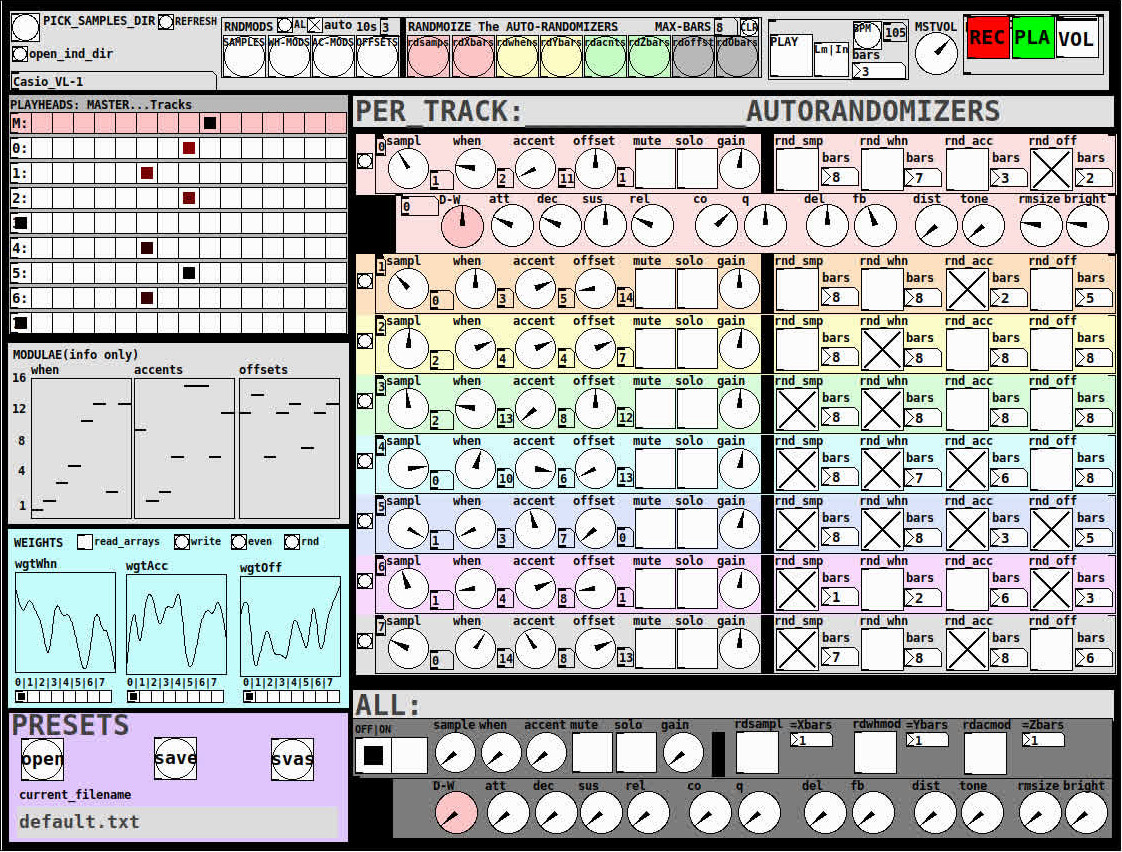
THE 7 SECTIONS:
- GLOBAL:
- to set parameters for all 8 tracks, exs. pick the samples directory from a tof/pmenu or OPEN_IND_DIR (open an independent directory) (see below "Samples"for more detail)
- randomizing parameters, random all. randomize all every 10*seconds, maximum number of bars when randomizing bars, CLR the randomizer check boxes
- PLAY, L(imited) or I(nfinite) counter, if L then number of bars to play before resetting counter, bpm(menu)
- MSTVOL
- transport/recording (on REC files are automatically saved to ./ganymede/recordings with datestamp filename, the output is zexy limited to 98 and the volume controls the boost into the limiter)
- PLAYHEADS:
- indicating where the track is "beating"
- blank=no beat and black-to-red where redder implies greater env~ rms
- MODULAE:
- for information only to show the relative values of the selected modulators
- WEIGHTS:
- sent to [list-wrandom] when randomizing the When, Accent, and Offset modulators
- to use click READ_ARRAYS, adjust as desired, click WRITE, uncheck READ ARRAYS
- EVEN=unweighted, RND for random, and 0-7 for preset shapes
- PRESETS:
- ...self explanatory
-
PER TRACK ACCORDION:
- 8 sections, 1 per track
- each open-closable with the left most bang/track
- opening one track closes the previously opened track
- includes main (always shown)
- with knobs for the sample (with 300ms debounce)
- knobs for the modulators (When, Accent, and Offset) [1..16]
- toggles if you want that parameter to be randomized after X bars
- and when opened, 5 optional effects
- adsr, vcf, delayfb, distortion, and reverb
- D-W=dry-wet
- 2 parameters per effect
-
ALL:
when ON. sets the values for all of the tracks to the same value; reverts to the original values when turned OFF
MIDI:
CC 7=MASTER VOLUME
The other controls exposed to midi are the first four knobs of the accordion/main-gui. In other words, the Sample, When, Accent, and Offset knobs of each track. And the MUTE and SOLO of each track.
Control is based on a midimap file (./midimaps/midimap-default.txt).
So if it is easier to just edit that file to your controller, then just make a backup of it and edit as you need. In other words, midi-learn and changing midimap files is not supported.
The default midimap is:
By track
CCs
| ---TRACK--- | ---SAMPLE--- | ---WHEN--- | ---ACCENT--- | --- OFFSET--- |
|---|---|---|---|---|
| 0 | 16 | 17 | 18 | 19 |
| 1 | 20 | 21 | 22 | 23 |
| 2 | 24 | 25 | 26 | 27 |
| 3 | 28 | 29 | 30 | 31 |
| 4 | 46 | 47 | 48 | 49 |
| 5 | 50 | 51 | 52 | 53 |
| 6 | 54 | 55 | 56 | 57 |
| 7 | 58 | 59 | 60 | 61 |
NOTEs
| ---TRACK--- | ---MUTE--- | ---SOLO--- |
|---|---|---|
| 0 | 1 | 3 |
| 1 | 4 | 6 |
| 2 | 7 | 9 |
| 3 | 10 | 12 |
| 4 | 13 | 15 |
| 5 | 16 | 18 |
| 6 | 19 | 21 |
| 7 | 22 | 24 |
SAMPLES:
Ganymede looks for samples in its ./samples directory by subdirectory.
It generates a tof/pmenu from the directories in ./samples.
Once a directory is selected, it then searches for ./**/.wav (wavs within 1-deep subdirectories) and then ./*.wav (wavs within that main "kit" directory).
I have uploaded my collection of samples (that I gathered from https://archive.org/details/old-school-sample-cds-collection-01, Attribution-Non Commercial-Share Alike 4.0 International Creative Commons License, 90's Old School Sample CDs Collection by CyberYoukai) to the following link on my Google Drive:
https://drive.google.com/file/d/1SQmrLqhACOXXSmaEf0Iz-PiO7kTkYzO0/view?usp=sharing
It is a large 617 Mb .7z file, including two directories: by-instrument with 141 instruments and by-kit with 135 kits. The file names and directory structure have all been laid out according to Ganymede's needs, ex. no spaces, etc.
My suggestion to you is unpack the file into your Path so they are also available for all of your other patches.
MAKING KITS:
I found Kits are best made by adding directories in a "custom-kits" folder to your sampls directory and just adding files, but most especially shortcuts/symlinks to all the files or directories you want to include in the kit into that folder, ex. in a "bongs&congs" folder add shortcuts to those instument folders. Then, create a symnlink to "bongs&congs" in your ganymede/samples directory.
Note: if you want to experiment with kits on-the-fly (while the patch is on) just remember to click the REFRESH bang to get a new tof/pmenu of available kits from your latest ./samples directory.
If you want more freedom than a dynamic menu, you can use the OPEN_IND(depedent)_DIR bang to open any folder. But do bear in mind, Ganymede may not see all the wavs in that folder.
AFTERWARD/NOTES
-
the [hcs/folder_list] [tof/pmenu] can only hold (the first) 64 directories in the ./samples directory
-
the use of 1/16th notes (counter-interval) is completely arbitrary. However, that value (in the [pd global_metro] subpatch...at the noted hradio) is exposed and I will probably incorporate being able to change it in a future version)
-
rem: one of the beauties of this technique is: If you don't like the beat,rhythm, etc., you need only click ALL to get an entirely new beat or any of the other randomizers to re-randomize it OR let if do that by itself on AUTO until you like it, then just take it off AUTO.
-
One fun thing to do, is let it morph, with some set of toggles and bars selected, and just keep an ear out for the Really choice ones and record those or step in to "play" it, i.e. tweak the effects and parameters. It throws...rolls...a lot of them.
-
Another thing to play around with is the notion of Limited (bumpy) or Infinite(flat) sequences in conjunction with the number of bars. Since when and where the modulator triggers is contegent on when it resets.
-
Designed, as I said before, to be played, esp. once it gets rolling, it allows you to focus on the production (instead of writing beats) by controlling the ALL and Individual effects and parameters.
-
Note: if you really like the beat Don't forget to turn off the randomizers. CLEAR for instance works well. However you can't get the back the toggle values after they're cleared. (possible feature in next version)
-
The default.txt preset loads on loadbang. So if you want to save your state, then just click PRESETS>SAVE.
-
[folder_list] throws error messages if it can't find things, ex. when you're not using subdirectories in your kit. No need to worry about it. It just does that.

POSTSCRIPT
If you need any help, more explanation, advise, or have opinions or insight as to how I can make it better, I would love to hear from you.
I think that's >=95% of what I need to tell you.
If I think of anything else, I'll add it below.
Peace thru Music.
Love thru Pure Data.
-s
,
Dynamically patched vslider with local send symbol
@oid This is a problem from my 2nd ever dynamic patch, so I wouldn't try to read deep meaning into my questions  . Like my first dynamic patch, it's just a patch that generates the repetitive, static parts of other patches--a way to reduce the tedium of having to edit multiple send/receive names by hand, that's all. I'm expecting to have to cut and paste from this helper patch into the patch I'm really trying to write, so the value of $0 in the generating patch is irrelevant. Is that reasonable? In a patch that needed its UI to be dynamically generated, your way would make total sense, but I'm def not there yet. Also, regarding your other topic, I think the message that dynamically generates a vslider can itself be static, so I'm not sure that add2 technique is applicable.
. Like my first dynamic patch, it's just a patch that generates the repetitive, static parts of other patches--a way to reduce the tedium of having to edit multiple send/receive names by hand, that's all. I'm expecting to have to cut and paste from this helper patch into the patch I'm really trying to write, so the value of $0 in the generating patch is irrelevant. Is that reasonable? In a patch that needed its UI to be dynamically generated, your way would make total sense, but I'm def not there yet. Also, regarding your other topic, I think the message that dynamically generates a vslider can itself be static, so I'm not sure that add2 technique is applicable.
@ingox OK, now I'm getting the same results as you, which is odd because the patch I've presented is just a small example from a larger patch that was giving me trouble. After discovering the $\$0 syntax I applied it to that larger patch, saw that it too was working, and then posted this topic. But now my larger patch is broken, which makes me believe that the system is behaving differently since running your patches (and that I wasn't previously hallucinating). But that can't be true, right?
So here's another small patch to demonstrate how my larger patch is (now) broken: dynamicPatchVerticalSlider2.pd
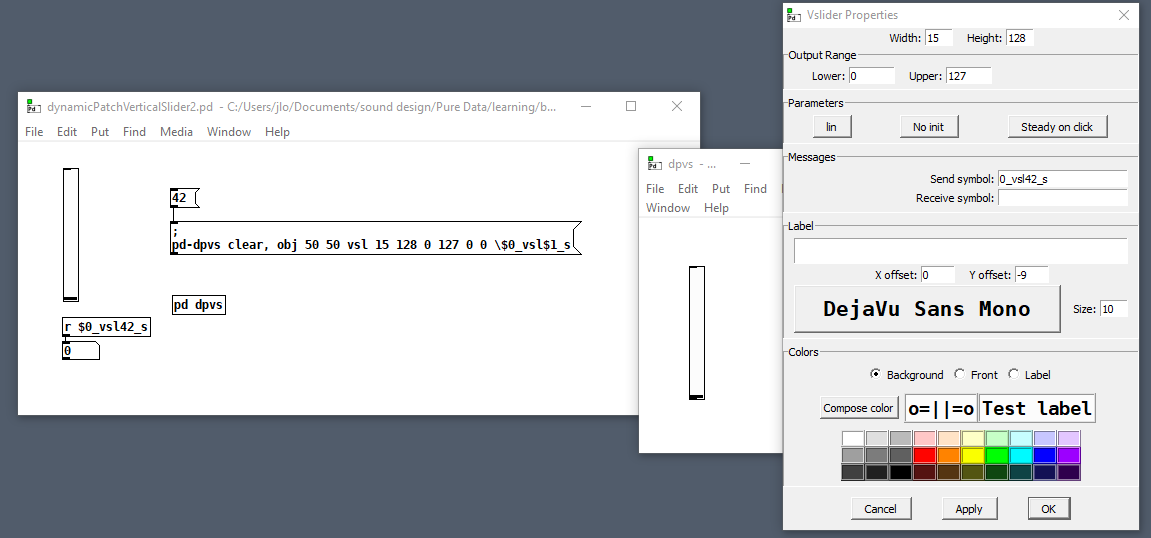
See how \$0 is just generating a 0 in the send symbol? When I save and reload it to test the fader (which doesn't work), the backslash gets dropped from the creation message!
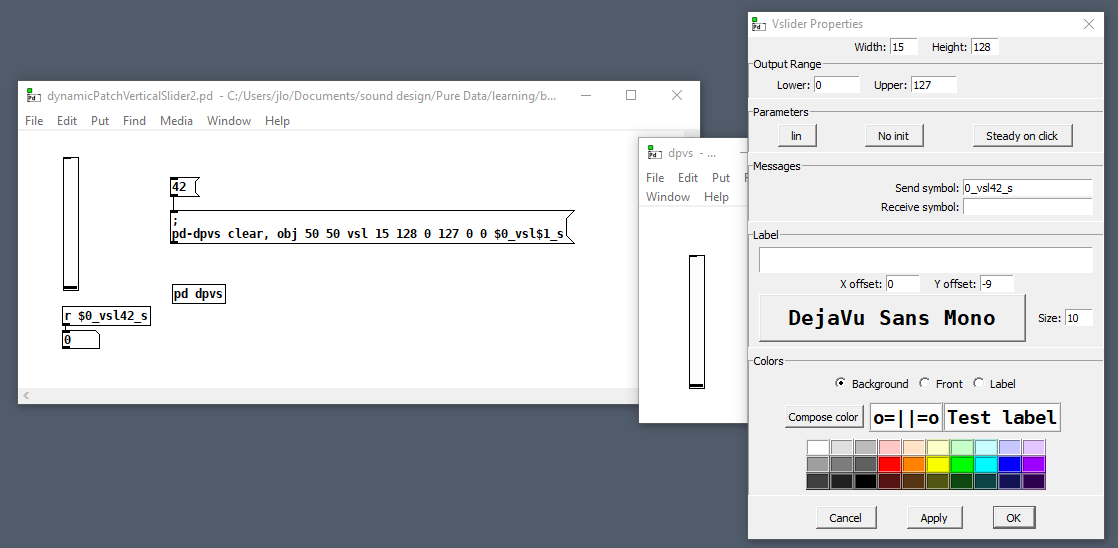
So next I try falling back to the syntax I got working earlier, and the generated vslider send symbol looks good
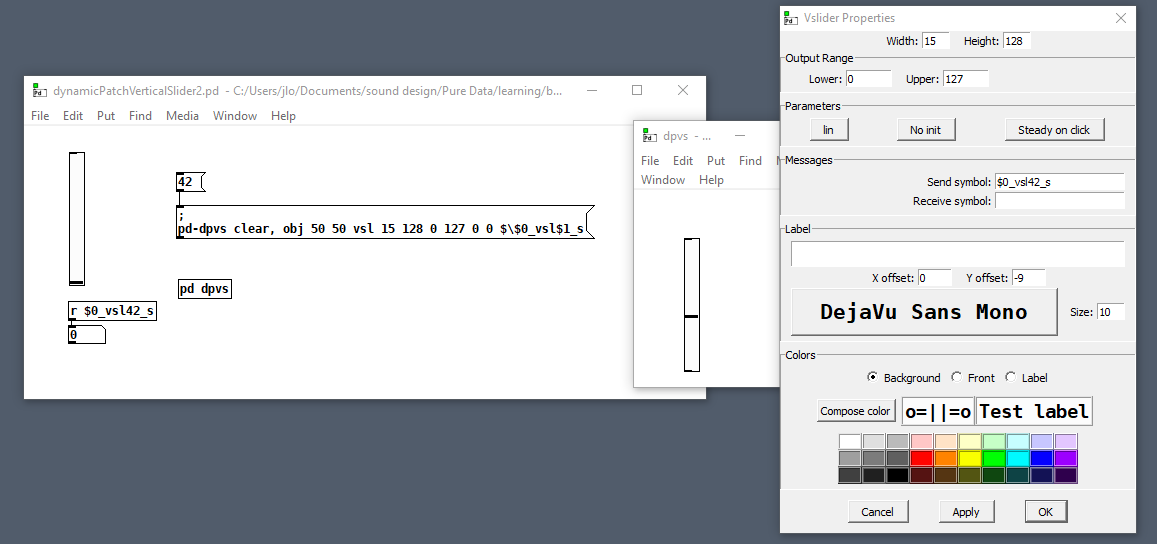
and on reloading it I can confirm that it is good, but now I can't use my generating patch because $1 is backslash escaped!
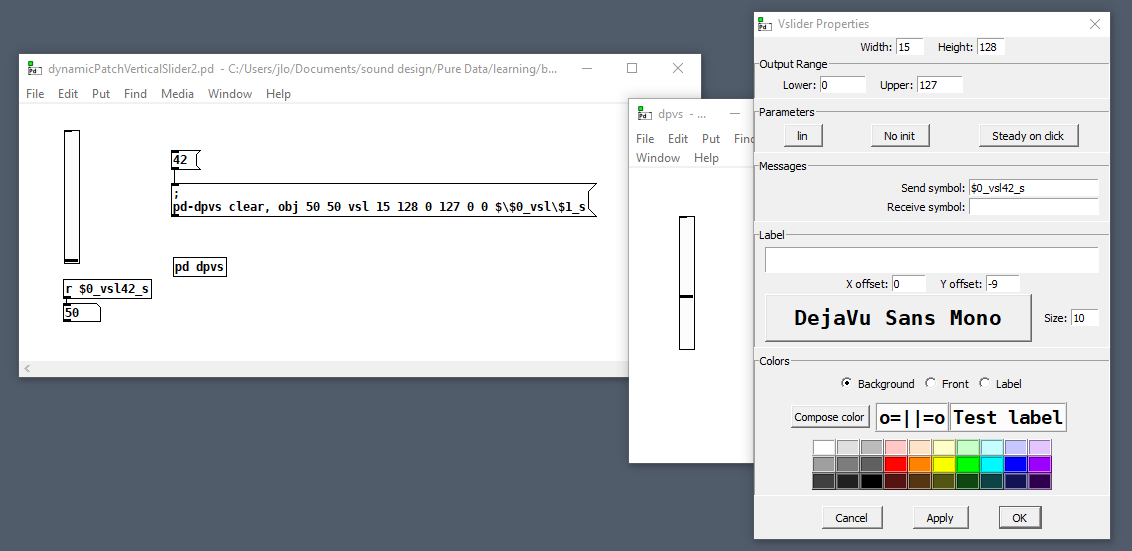
Pd (LibPd) <-> JACK client: pd2jack
Another new release for pd2jack (v0.1.9):
https://github.com/GModal/pd2jack
New with v0.1.9, enabling interactive mode (-i) interprets a "live stream" of parameter pairs (in the console), which are passed on as "param" messages to the Pd patch. These work like the startup "parameter pairs," except for:
- No quotes are required
- Passed in real time during run
- Each pair is terminated with a newline
A stream of pairs might look something like this:
1 89
1 88
1 87
1 86
3 2180
3 2200
3 2221
3 2241
3 2261
4 19
NOTE: this has some cool implications -- a separate GUI application can act as a front-end, and "pipe" data into pd2jack.
So ANY GUI api could be used...just convert any input to parameter pairs and print them to the console. This isn't a crazy as it sounds -- two applications connected with a pipe are separate processes, and if the numeric char strings aren't actually printed to the console (the are not, with pipe), the CPU load is pretty small.
Here's a example of how it's invoked:
./revUI | pd2jack -i -p rev_i.pd
(where revUI is the GUI, and pd2jack is running the "rev_i.pd" patch in interactive mode.)
Simple video demo:
There are other options for IPC with Pd (netsend, netreceive & some custom objects) and piping the console might feel like a hack, but it is simple and quick. An additional method (sockets?) might be added to pd2jack in the future...(yeah, I'm thinking maybe a plugin interface).
It's also been suggested this mode might be useful for people with disabilities. I've also successfully piped the output of pd2jack to a speech synthesis module, sending text via Pure Data's [print] object, as well as any info output in "verbose" mode. Of course, that could probably be done in a normal "headless" Pure Data.
Interactive Mode Special Commands (w/ "@" prefix)
Interactive mode also includes a set of special cmds, for controlling some internal operations. Each of these cmds is preceeded with an "at" symbol (@), to differentiate the cmds from the parameter stream. Here's a list:
- @openPatch <name> : load a different patch into the LibPd space (closes current patch first).
- @closePatch : closes the current patch
- @reopenPatch : reopens the last valid patch (patch can be closed or already open)
- @im_sleepTime <int> : sleep time (ms, 5-500) between data fetches for interactive mode.
Invoking "@reopenPatch" on an already open patch will reload the patch.
I expect more cmds will be added in the future.
I don't understand \[fexpr~\]?
@Obineg [fexpr~] is quite a bit less efficient than [expr~]
so, if you don't need per-sample memory or feedback it is much better to use [expr~]
why? because in order to store each of the output samples for the current processed sample, [fexpr~] needs to operate on single passes of the perform loop, then store the input and output samples.
I think since [expr~] deals with a block (vector) of samples it is generally more efficient since it can pipeline and vectorize the actual instructions. And it's not possible to do that if the next output sample is dependent on the current output sample.
plus, due to the way pd uses the input and output samples in a dsp graph, the input and output buffer might be the same buffer. This means that if you want to read an input sample from the past you first have to store it somewhere to make sure it won't be overwritten when writing to the output. so [fexpr~] also has to do that when [expr~] doesn't (since [expr~] only processes input samples as a vector).
basically: [expr~] operates on the whole vector/block (meaning the constituent functions/operators are applied "at once" over the vector/block for every part of the computation), [fexpr~] operates on the individual samples of that vector/block. (meaning the constituent functions/operators are applied in turn to every sample in the block, one at a time, for every part of the computation)
Paths and organizing .pd files for use.
@raynovich I use the [declare] object instead of paths, keeps the paths list shorter and more manageable and also gives you a nice list of dependencies right in the patch so you never have to wade through the patch trying to figure out what it needs if you want to share the patch or copy it to a different machine. If you need a sub-folder you just declare the sub-folder. Use absolute paths when you declare, this way you can move the patch and it will still find what it needs. I generally have a sub-patch in each patch for declares and I avoid declaring folders, just declare the abstraction directly so I never have to try and figure out which abstractions a given patch uses, just open the declare sub-patch and it is all there. In my pd folder I have all my current patches, an abstractions folder, a folder for patches I am not currently working on and a folder for reference patches. I do my best to avoid making abstractions which only have use in a single patch, I will figure out how to generalize it to make it more useful for other patches so it can live in my abstraction folder without cluttering it up and helps avoid needing folders for patches. When a patch must have a folder it goes in the pd directory with the patch and I declare it instead of keeping the patch in it's own directory, this is mainly to minimize having to navigate folders as much.
Using [declare] to explicitly declare individual abstractions also makes it easier to clean your abstraction folder, a simple shell script can check for abstractions which are not used by any patch or ones that just get used by a single patch so you can check them out to see if they are worth keeping or should be moved too the folder of that one patch which uses them.


